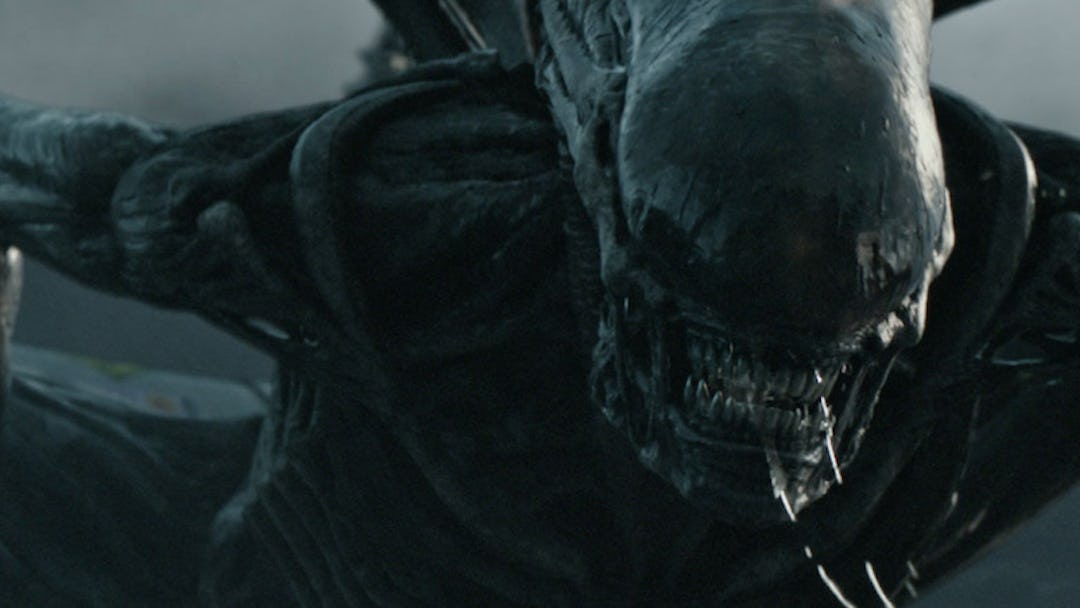We forge complicated relationships with the filmmakers we love, particularly those who work in genre, when it comes to matters of ambition and repetition. It’s not hard to puzzle out why – when a director is really good at one specific thing, a good fan wants to encourage their growth and maturity, while at the same time wanting them to keep doing that one specific thing they’re really good at, which may very well be the main reason we’re fans in the first place. You probably have your own go-to examples, but I think of it as the Scorsese Syndrome; I admire and even often enjoy his quiet, meditative religious studies, but am also secretly relieved when he gets one out of his system, because that means he’ll probably make a slam-bang crime picture next. (I am aware this makes me something of a philistine, and have accepted it.)
Ridley Scott complicates this paradox a bit, because he can work in a pretty dazzling array of genres — he’s done period epics and war movies and crime pictures and drama and sci-fi and Grand Guignol and even a con caper comedy with a heart, and he’s pulled them all off. The breadth of his gift is part of why it seemed strange that he wanted to return to the Alien franchise three-plus decades after he kicked it off, but that lapse in time and experience helped explain why Prometheus was such a mess — cashing in on the original picture’s iconography and goodwill, and hoping they’d spackle over the shoddy storytelling and irritating riddle-making. His new entry, the Prometheus-sequel-but-still-Alien-prequel Alien: Covenant, is a better film than Prometheus, but it’s beset by many of the same difficulties.
Covenant picks up ten years after Prometheus, beginning with an odd opening duet between Michael Fassbender and Guy Pearce, whose “where do we come from” philsophizin’ should serve as a warning siren, before joining the colonization vessel Covenant en route to a new planet with two thousand sleeping colonizers and a crew of couples in tow. When an accident wakes the crew and kills the captain, they pick up a rogue signal that seems to be calling them to a much closer planet, where whaddaya know, its living conditions are totes compatible. “It’s too good to be true,” predicts proto-Ridley Katherine Waterston, and guess what, she’s right.
Throughout this table-setting, Scott is giving his audience an abundance of credit, presuming they’ll wait it out for the “good stuff” they’ve come for in an Alien movie. But it’s worth the wait – the way he intermingles the senses of wonder and dread during the planet’s initial exploration is remarkable, a slow build that’s ramped up quickly with pounding music, an increase in the editing tempo, and a lightning-quick transition from sci-fi to horror with one of the franchise’s all-time great set pieces. When they showed that sequence, in which an alien host is locked in a medical bay with another crew member, to an enthusiastic audience at SXSW, this viewer allowed himself to push aside the lingering odor of Prometheus and get excited about Covenant. Only later did I realize that had I only seen the self-surgery sequence in Prometheus, I might’ve presumed that was a great movie too.
Still, Covenant doesn’t really go into the mud until the back half, when the undergrad philosophy discourse returns, supplemented by a frustrating surplus of moments (as in Prometheus) in which ostensibly smart people act with unaccountable stupidity around killer creatures, a climax borderline unwatchable in its choppiness (and in which co-star Danny McBride announces “We’ve got company” – twice), and a SHOCKER last beat that I called a good twenty minutes early, and so will you.
There are things here that work: the impressive effects, Waterston’s stony resolve, Billy Crudup’s strong work as a guy who’s a little weak, and the virtuosity of Fassbender’s dual performance (it takes seeing both of his characters together to fully appreciate the shadings that separate them). But as the film descends into flashbacks and navel-gazing, its miscalculation is as overwhelming as an alien in your stomach: less mythmaking, more monsters. I’m sure this is exactly the kind of Alien movie Scott wants to make now, and based on these two films, it’s probably safe to assume that he’s mostly there for the very elements that drag the pictures down, throwing in the big action/horror beats to pull in the audience and keep them at bay. But that’s also the problem: even half-heartedly, he does those scenes better than just about anybody in the game. It’s just become a question of how patiently you’re willing to wait for them.
“Alien: Covenant” is out tomorrow.
